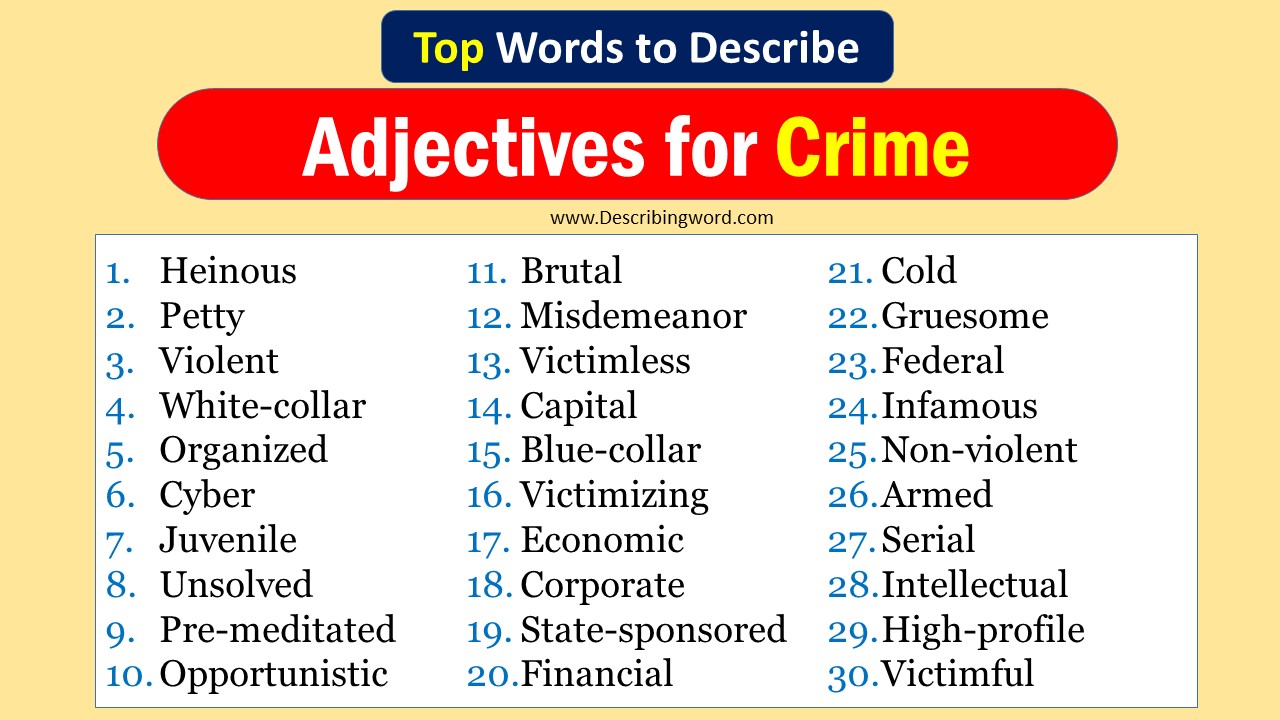Crime evokes a range of emotions and judgments. Adjectives can help capture the nuances and contexts in which crimes occur, allowing for a deeper understanding and varied perspectives.
Description of Crime
Crime refers to acts committed in violation of laws, leading to punishment if the perpetrator is caught and proven guilty.
Words to Describe Crime
Here are the 30 most common words to describe Crime:
- Heinous
- Petty
- Violent
- White-collar
- Organized
- Cyber
- Juvenile
- Unsolved
- Pre-meditated
- Opportunistic
- Brutal
- Misdemeanor
- Victimless
- Capital
- Blue-collar
- Victimizing
- Economic
- Corporate
- State-sponsored
- Financial
- Cold
- Gruesome
- Federal
- Infamous
- Non-violent
- Armed
- Serial
- Intellectual
- High-profile
- Victimful
Positive Words to Describe Crime
(Note: While crimes are generally seen as negative acts, some descriptors might be used in specific contexts to indicate lesser severity or different perspectives on crime.)
- Victimless
- Non-violent
- Petty
- Blue-collar
- White-collar
- Economic
- Intellectual
- Corporate
- Financial
- Opportunistic
Negative Words to Describe Crime
- Heinous
- Brutal
- Violent
- Gruesome
- Victimizing
- Armed
- Serial
- Cold
- High-profile
- State-sponsored
Adjectives for Crime (Meanings and Example Sentences)
Heinous
- Meaning: Shockingly wicked.
- Sentence: The heinous act horrified the community.
Petty
- Meaning: Minor, trivial offense.
- Sentence: It was a petty theft charge.
Violent
- Meaning: Using physical force.
- Sentence: The violent robbery alarmed the town.
Cyber
- Meaning: Related to computers.
- Sentence: The bank faced a cyber attack.
Juvenile
- Meaning: Involving young people.
- Sentence: He committed a juvenile offense.
Unsolved
- Meaning: Not resolved.
- Sentence: The case remains unsolved.
Opportunistic
- Meaning: Taking advantage.
- Sentence: The theft was opportunistic.
Brutal
- Meaning: Cruel, harsh.
- Sentence: The brutal crime was on the news.
Capital
- Meaning: Leading to death penalty.
- Sentence: He faces a capital charge.
Economic
- Meaning: Financial in nature.
- Sentence: The economic crime impacted investors.
Other Words to Describe Crime
Words to Describe Crime Scene
- Bloody
- Disturbed
- Chaotic
- Forensic
- Pristine
- Cordoned
- Grisly
- Documented
- Contaminated
- Analyzed
Words to Describe Crime Fiction
- Thrilling
- Suspenseful
- Dark
- Mysterious
- Intriguing
- Twisted
- Complex
- Gritty
- Hard-boiled
- Riveting
Words to Describe Crime and Punishment
- Justified
- Retributive
- Deterrent
- Rehabilitative
- Harsh
- Lenient
- Merciful
- Restorative
- Proportional
- Arbitrary
Words to Describe True Crime
- Real-life
- Documented
- Graphic
- Chilling
- Revealing
- Authentic
- Sensational
- Unfiltered
- Detailed
- Unsettling
Words to Describe Youth Crime
- Adolescent
- Rebellious
- Early-age
- Minor
- Peer-driven
- Inexperienced
- Misguided
- Non-serious
- Formative
- Impulsive
Words to Describe Bad Crime
- Atrocious
- Unforgivable
- Monstrous
- Malicious
- Cruel
- Sadistic
- Inhumane
- Vile
- Repugnant
- Appalling
Words to Describe Born a Crime
(Note: “Born a Crime” is a book by Trevor Noah, and the adjectives reflect themes or feelings related to the book.)
- Autobiographical
- Humorous
- Thought-provoking
- Eye-opening
- Engaging
- Heartfelt
- Candid
- Reflective
- Poignant
- Insightful
How to Describe Crime in Writing?
Crime, in its many forms, evokes strong reactions and paints vivid imagery. When writing about crime, one must consider the context and the message they aim to convey. Is it a straightforward reporting of events, or is there an underpinning commentary on society, psychology, or ethics? The choice of descriptors can significantly influence the reader’s emotions and perspective.
Using sensory details can make the account more immersive. The scene, the sounds, the atmosphere — all of these can be used to enhance the narrative and make it more memorable. The choice of adjectives, from the starkness of a ‘bloody scene’ to the cold calculation of a ‘premeditated act’, adds layers of depth.
Additionally, remember that crimes can be controversial and sensitive topics. Balance is essential. Being aware of biases, avoiding sensationalism, and respecting the affected parties will ensure that the description is both impactful and ethical.
Explore Related Words:
